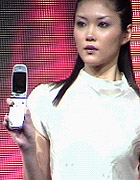Vodafone KK: J-Phone Not Lost in Translation?
Those watching this week’s video program will get to see what a howler Bow-Lingual is on Vodafone’s new V610SH handset from Sharp. We are just itching to find out if the same inventive and creative genius that seemed to permeate the old J-Phone can re-establish itself in 2004 at Vodafone KK. A recent study shows that, as we suspected, the Japanese public is going gangbusters for TV mobile phones. Having developed Japan’s first TV celly, the former J-Phone Corps have proven, yet again, they were ahead of the curve in understanding what customers want. But it is also apparent that Vodafone KK will need more than highly entertaining doggy gimmicks if it is to stop losing market share to KDDI and DoCoMo’s 3G services.


 Last December, DoCoMo unveiled its new 900i series phones in a
Last December, DoCoMo unveiled its new 900i series phones in a